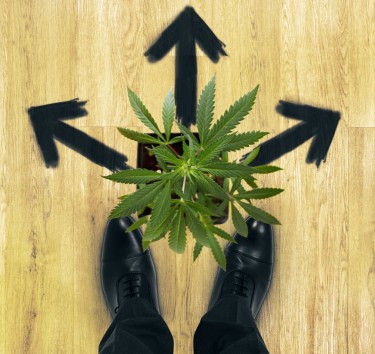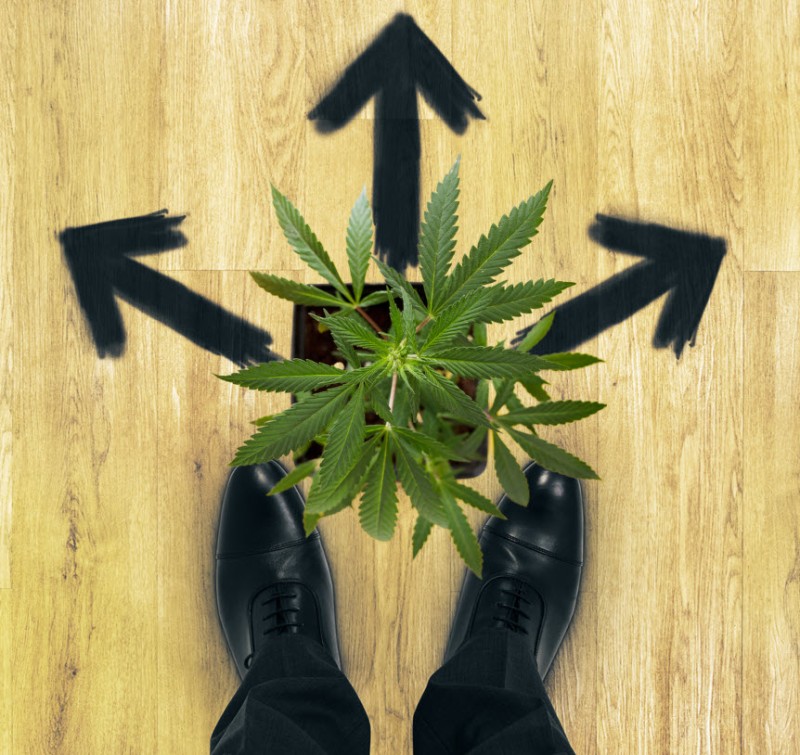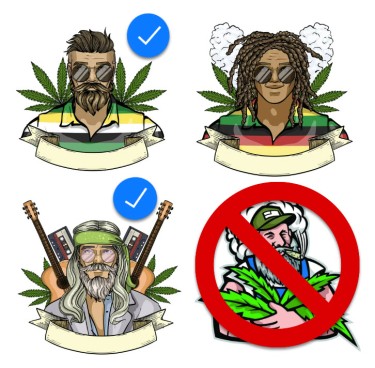
The U.S. Department of Agriculture is instructing hemp farmers in multiple states that they must choose between cultivating cannabis or hemp, not both, as reported by Politico.
Since the 2018 Farm Bill legalized hemp agriculture, numerous farmers across the nation saw it as a promising avenue for profitability. With the ongoing expansion of marijuana legalization, some hemp farmers view opportunities in participating in cannabis programs regulated by their respective states.
However, this business strategy is now under threat as the USDA has notified growers in various states that their federal hemp-growing licenses may be canceled if they continue cultivating both hemp and marijuana.
Connor Reeves, a cannabis attorney at McLaughlin PC in Jackson, Mississippi, criticized this move, stating, "It's another attack on the little guy. They don't seem to care about the impact on small farmers and rural communities that are otherwise complying with the law."
The USDA is responsible for approving all state hemp programs, as mandated by the 2018 Farm Bill, and directly oversees hemp growers in eight states, including Mississippi, lacking their regulatory programs. Seven of these states have also legalized medical or recreational cannabis.
Eric Sorenson, a hemp farmer in Mississippi, faced obstacles when he considered cultivating medical marijuana following its legalization in the state. The USDA informed him that he would lose his hemp-growing license if he also pursued medicinal weed.
In an email obtained by Politico, the USDA stated, "While Medical Cannabis is not federally legal, we will not be able to allow you to maintain your current hemp license in addition to the medical cannabis cultivator license."
Sorenson expressed frustration, stating, "It doesn't make any sense. It's the same plant."
USDA Navigates the Complex Regulatory Terrain
The USDA has refrained from commenting on the specific decisions to revoke or deny certain hemp licenses. However, Allan Rodriguez, an agency spokesperson, acknowledged the complexity of the issue due to the varying legality of marijuana at state and federal levels.
"While the 2018 Farm Bill legalized hemp production, marijuana remains a Schedule I controlled substance under federal law," Rodriguez stated. "This presents a unique jurisdictional and regulatory landscape that producers of more traditional agricultural commodities do not have to navigate."
Rodriguez emphasized the USDA's commitment to assisting farmers in understanding hemp-related regulations and providing support through research, risk management, and conservation tools.
The USDA asserted that it oversees all states and growers in the hemp program uniformly. Nonetheless, some states directly regulating hemp have issued cultivation licenses for both hemp and marijuana to certain growers. In Vermont, where the USDA manages hemp agriculture, farmers have been informed by the agency that simultaneous cultivation of hemp and marijuana is not permissible.
Sam Bellavance, a cannabis farmer in Vermont, held separate licenses for growing both marijuana and hemp until the USDA revoked the hemp license earlier this year. As a result, he anticipates his business will suffer a loss of approximately $250,000 in revenue.
"It was definitely a significant setback to our business," expressed Bellavance.
However, some Vermont farmers persist in cultivating both hemp and marijuana. Cary Giguere, Compliance Director of the Vermont Cannabis Control Board, acknowledged that his agency is aware of growers continuing to cultivate both crops.
The inconsistency in regulations has discouraged certain retailers from stocking hemp products, according to hemp industry officials. This hesitancy has contributed to a decline in hemp prices, prompting many growers to either abandon or reduce their hemp operations. In 2019, farmers planted 275,000 acres of hemp, a figure that dwindled to just 21,000 acres last year, as reported by Hemp Benchmarks. Insiders in the industry argue that the USDA's decision to revoke hemp licenses is exacerbating the turmoil in the regulated hemp sector.
Tim Bryon Fair, founder of the Vermont Cannabis Solutions law practice, expressed frustration, stating, "It's just another example of the absurdity of keeping a substance, for which now 55 percent of Americans live in a jurisdiction where it's legal, federally illegal. It's insane."
Sherry Boodram, CEO, and co-founder of the cannabis consulting firm CannDelta Inc., highlighted the challenges arising from the continued federal prohibition of marijuana. In an email to High Times, Boodram wrote, "The disconnect between US federal and state laws pertaining to cannabis will continue to create unfair barriers for industry participants until cannabis becomes federally legal. This is an example of the unexpected hurdles the industry is continuing to be faced with. The fact that the U.S. Department of Agriculture is revoking hemp licenses for farmers who were given the choice to grow cannabis in states where it's legal is, in my opinion, as ridiculous as legally being able to sell hemp-derived THC (such as delta 8)."
Industry Turmoil and Economic Fallout
The USDA's directive to revoke hemp licenses is sending shockwaves through the hemp industry, leading to a state of turmoil and economic uncertainty. With growers facing the ultimatum of choosing between hemp and marijuana cultivation, the industry is witnessing disruptions that extend beyond individual farms. The ripple effect includes hesitancy among retailers to carry hemp products due to the regulatory inconsistency, exacerbating the economic fallout.
As hemp prices decline, many farmers are forced to reconsider or scale back their operations, leading to a stark contrast from the optimistic outlook following the 2018 Farm Bill's legalization of hemp agriculture. The drastic reduction in planted acres—from 275,000 in 2019 to a mere 21,000 last year, according to Hemp Benchmarks—underscores the challenges posed by the USDA's decision. The industry, grappling with this unexpected setback, emphasizes the urgent need for a comprehensive, federally legalized framework that aligns with the evolving landscape of state cannabis regulations. The USDA's commitment to uniform oversight is being questioned amid the increasing complexity of the regulatory environment, leaving farmers and industry stakeholders in a precarious situation.
Bottom Line
The USDA's directive forcing hemp farmers to choose between cultivating cannabis or hemp has triggered a cascade of challenges, causing economic upheaval and setbacks for many in the industry. The inconsistency in regulations, coupled with the decline in hemp prices, is not only impacting individual farmers but also influencing retailers' decisions and hindering the growth of the hemp sector. As the industry grapples with the aftermath of revoked licenses and financial losses, there is a pressing call for a comprehensive and federally legalized framework to harmonize the regulatory landscape. The current situation highlights the urgent need for a more nuanced approach that considers the evolving state-level cannabis regulations and ensures fair treatment for farmers and stakeholders, ultimately fostering a more stable and sustainable future for the hemp industry.
HEMP FARMERS IN THE USA, READ ON...
WHY IS THE USDA ONLY CRACKING DOWN ON CERTAIN HEMP FARMERS?






